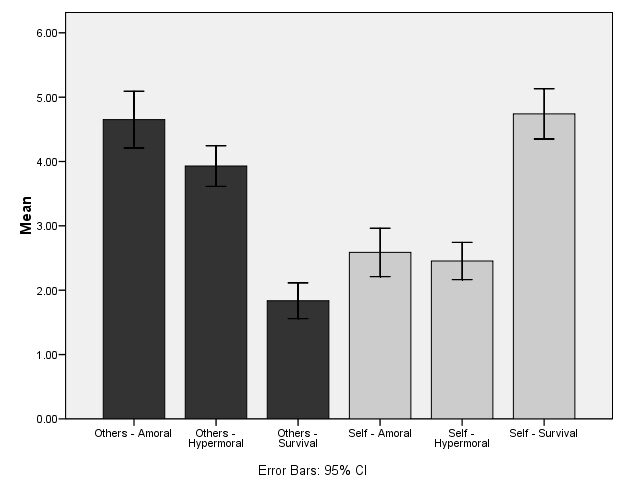The Psychology of Aggression and the Ugliness of the Health Care Reform Debate
Most people are not violent people. From an evolutionary perspective, there are high costs involved for a member of a species to kill other members of it’s own species. Soldiers in war have to be trained out of their natural impulse not to fire weapons. For the vast majority of people, aggression is a last resort and I’m guessing that most readers have anecdotal evidence of this as rarely do everyday disagreements escalate into physical or even direct verbal attacks. It’s usually not worth the risk and stress to our systems.
There is lots of psychological research on how to reduce these inhibitions (e.g. dehumanization, Milgram’s obedience studies), but there is little research (feel free to let me know if I’m wrong about this and I’ll edit this) on the positive pressures towards aggression. Among the ideas I am familiar with are Sherif’s classic studies on competition for limited resources, which are echoed in Robert Wrights’s ideas about zero-sum competitions leading to conflict. However, competition itself is just a circumstance and it doesn’t necessarily get at the psychological mechanism for group level aggression. For example, people may compete because they covet a particular resource or they may compete because they need that resource to survive.
A couple years ago, I hypothesized that individuals are moved to aggression because of an excess of moral principle, rather than the absence of moral principle. In the context of the health care reform debate, this may mean harming others “for the greater good”, which could be defined as saving unborn fetuses, providing health care to the sick, defending the constitution, fighting for liberty, or an assortment of other moral principles which have been asserted by both sides as justifying actions that might normally be considered out of bounds. In the past few days, we have seen gun threats, windows broken, the elderly disrespected, and slurs and spit hurled at politicians. These incidences of crossing boundaries in the name of a cause are not limited to one party as those in favor of health care have harassed Bart Stupak and tried to have Joe Lieberman’s wife fired. No side has a monopoly on the ugliness.
I don’t have data that speaks directly to this question, but I do have this graph to consider. At the time that I started thinking about what I call ‘hypermoralism’, I created a small educational website that I thought I’d use to gather some exploratory data as I thought about these issues. The website is still in beta but the results of the initial survey are interesting. I asked people to think of a group that committed violence against civilians (e.g. 30% picked the Nazis) and think of the motivations behind that violence. I then asked people to think of reasons why, in an extreme case, they themselves might endorse violence against civilians.
As you can see in the above graph, people believe that notorious groups that kill civilians are amoral (“They were amoral, having no moral standards.” or “They were seeking personal gain at the expense of others.”) most of all and were willing to entertain the idea that they were hypermoral (“They were killing people who belong to a specific group to avenge a past injustice committed by other members of that group.”) as that value was still close to the midpoint of the scale. Survival (“They were killing people because they themselves would be killed if they did not.”) was a distant third motivation.
In contrast, when people considered when they would potentially resort to violence against civilians, survival (of both the individual and the family, which loaded on the same factor in a factor analysis) was the prime potential motivator. Unfortunately, for my hypothesis, moral reasons were deemed no more likely than non-moral reasons for individuals, but I still think there is something to be learned.
Clearly, these scenarios are not directly comparable as the average respondent is likely actually different than the average Nazi or member of the Khmer Rouge. It’s not just a matter of perception. But if we believe in the vast amount of research on the fundamental attribution error, which shows that we underestimate situational pressure when others do bad things, there likely is some amount of attribution error occurring in this instance. It seems likely that many individuals within these notorious groups actually did feel some survival motivation that spurred their actions. For example, Hitler was quite poor, though clearly his actions went way beyond mere survival.
In the health care reform debate, it seems that a precursor to the ugliness is indeed couching the debate in terms of a life or death struggle for survival, justifying questionable behavior. Is America hanging by a thread? Then I suppose it’s worth taking extreme measures to save it. Are people dying every day that reform isn’t enacted? Then I suppose a few harassing calls to a congressman’s home are a small price to pay.
Politics in America can often be a zero-sum game and it is inevitable that passions will be inflamed on both sides. Liberals may have ‘won’ this vote, but we all lose when the debate gets too ugly and liberals are just as guilty of exaggeration when things don’t go their way. Indeed, I just received an email asking for help to “stop big corporations from taking over our democracy”, a reference to a recent Supreme Court decision which conservatives “won”. Such rhetorical devices may be useful, but we should all guard against where such exaggeration inevitably leads….ugliness.
– Ravi Iyer


